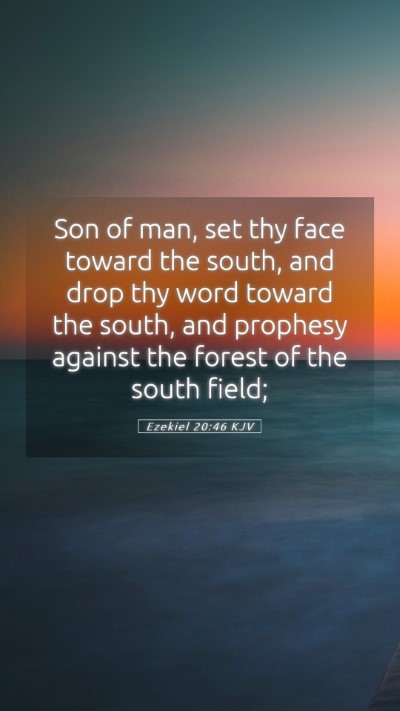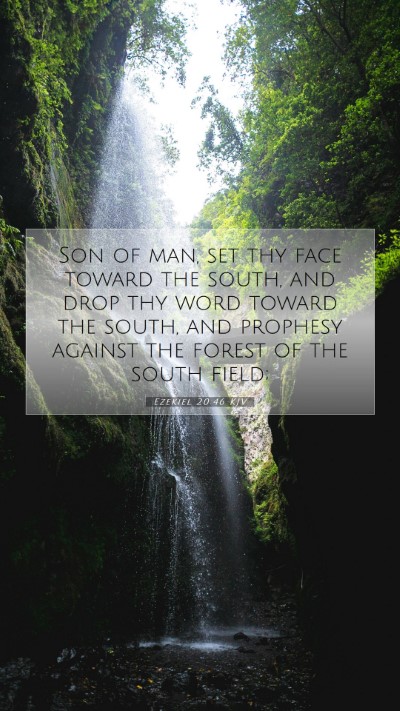Ezekiel 20:46 - Bible Verse Interpretation and Commentary
Verse Reference: Ezekiel 20:46
Verse Text: "Son of man, set your face toward the south, and preach against the south, and prophesy against the forest land of the South." (Ezekiel 20:46, ESV)
Understanding Ezekiel 20:46
This verse comes from a section where the prophet Ezekiel is given specific instructions by God on how to deliver His message to the people of Israel. As with many prophetic messages, this passage emphasizes both God's sovereignty and the urgent call for repentance among His people.
Context and Background
The context of this verse is critical for understanding its meaning. Ezekiel is a prophet taken into exile in Babylon, and he speaks to a people who are grappling with their disobedience and the consequences of their actions. His task includes warning them of impending judgment and calling them back to faithfulness. The 'south' mentioned here likely refers to the southern territory of Judah and its surrounding areas, which had been characterized by idolatry and rebellion against God.
Interpretation from Commentaries
- Matthew Henry's Commentary:
Henry points out that God's command for Ezekiel to set his face towards the south symbolizes a direct confrontation with the sins of the people residing in that area. It illustrates the seriousness of God's call to repentance, showing that no region is excluded from His purview or His message of judgment.
- Albert Barnes' Notes:
Barnes emphasizes the significance of the 'forests of the south,' suggesting that these forests could represent both natural beauty and the idolatrous practices that marred God's creation. The metaphoric language signifies the need for spiritual pruning and renewal among the people, calling them to abandon their misguided worship.
- Adam Clarke's Commentary:
Clarke highlights the aspect of Ezekiel’s prophetic task as a necessary act of warning against complacency and idolatry. By instructing Ezekiel to preach against the forest lands, God illustrates how even the most beautiful and bountiful parts of Judah were corrupted and in need of cleansing through divine intervention.
Key Themes
- Divine Judgment and Mercy: The verse encapsulates the dual themes of judgment for sin and the mercy found in repentance. God always provides a way for His people to return to Him, even when judgment seems imminent.
- Prophetic Responsibility: Ezekiel’s role as a prophet underscores the importance of delivering God’s messages faithfully, no matter how difficult or unwelcome they may be.
- The Call to Repentance: Through this verse, God calls His people to acknowledge their sins and turn back to Him, reflecting His desire for their restoration rather than their destruction.
Application and Relevance
The significance of Ezekiel 20:46 for modern readers lies in its timeless call for repentance and the understanding that God sees all aspects of our lives, even the hidden places represented by 'forests.' For personal application, it serves as a reminder that we are to examine areas of our lives that may not align with God’s will and seek His guidance for change.
Cross References
- Jeremiah 7:30-31 - Discusses the sins committed in the land, emphasizing the idolatry that prompts God’s warning.
- Ezekiel 18:30 - Calls the house of Israel to repentance, highlighting the importance of turning from sin.
- Isaiah 1:18-20 - God invites His people to reason with Him, urging them to turn from evil for their restoration and redemption.
Conclusion
Ezekiel 20:46 serves as a profound reminder of God’s character and His desire for His people to be faithful. The richness of this verse, examined through various commentaries, reveals deep insights into the nature of prophecy, divine judgment, and the invitation to repent. For those engaged in Bible study groups or online Bible study, considering the historical context and the meanings of such passages can yield bible study insights that are applicable not only in theological terms but in everyday life as well.


